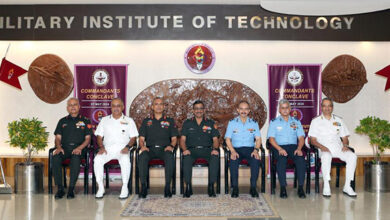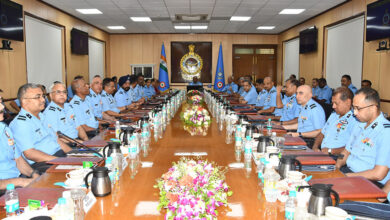Self Reliance in Aviation Lubricants
New Delhi. Three years ago, an article in a US journal described how the US sanctions had hurt India: HAL Hedges – US sanctions were a bitter experience for Indian manufacturer.
It reported as to how “the state owned Indian aircraft maker was hurt by the US sanctions imposed in 1998 and when it sent flight control systems for its Light Combat Aircraft (LCA) to the US for evaluation, they were impounded. Exports of components from HAL’s Advanced Jet Trainer and engines for its Dhruv Advanced Light Helicopter (ALH) were caught up in the ban which even covered the servicing of Indian Navy’s Sea King helicopters in the UK due to the use of US-manufactured parts”.
My immediate reaction on reading the text was that “Those who forget history are condemned to repeat it.”
The industrial policy resolution enunciated in 1956 with the preamble that “Self-reliance is the keynote of India’s industrial policy.” And went on to outline the many thrust areas, one of the predominant ones being the Defence sector.
The conflicts of 1962, 1965 and 1971 generated an experience which proved as to how fragile the fighting machinery could become due to lack Self Reliance in Aviation Lubricants of spare parts and consumables, and how risky it could be to be at the mercy of foreign suppliers who would be guided by their own interests.
By 1970s, massive programmes for indigenization of various weapon systems and related requirements were launched and there were directives and mandates given to the laboratories involved to ensure that the dependence on imports was progressively reduced, if not completely eliminated.
One of the major category of products identified was aviation lubricants.
It had been learnt the hard way that without the availability of the right type of lubricant, no aircraft could fly. How vital!
Similar situations with the operation of other military equipment only emphasized the fact that mobility and efficient working of any machine requires a well-formulated lubricant. In its absence, the best of machines becomes dead hardware.
The responsibility for indigenizing the lubricant production for the defence services fell on some premier institutes, namely the Indian Institute of Petroleum, Dehradun, Defence Materials Research & Development Establishment, Kanpur, and the Research & Development Centre of the Indian Oil Corporation at Faridabad, which in fact, contributed the maximum to this effort.
The defence services complemented the efforts by creating separate indigenization cells for the Indian Army, Navy and Air Force to coordinate the work and assist in timely projection of the grades to be developed, their priorities, and designing of field trial schemes for acceptance of products thus evolved. Notably, adequate test facilities were not available within the country.
The progress of the indigenization process was reviewed on quarterly basis, and by the mid-1980s, most of the lubricants required for the then inventory of land and se-based lubricants had been indigenized and approved for use.
It was a milestone.
There were problems though in the aviation lubricants. There was a lack of knowledge, equipment for evaluation and absence of certification procedures as most of the aircraft were of foreign origin. There was also the absence or shortage of base stocks, particularly those needed for formulating synthetic aero-engine oils.
Qualification and Type-approval was proving to be cumbersome, time consuming and very costly despite the best efforts. As the grant of such approvals was the prerogative of the foreign agencies, their reluctance to entertain requests from India was obvious.
Even the possibility of resorting to flight trials for acceptance could not be considered due to the safety and airworthiness issues, By 1986, the western authorities took a policy decision not to issue the Qualification documents to oil companies from non-NATO countries.
The Indian Oil Corporation then proposed a joint venture with a foreign partner who would give the knowhow and base materials and also assist in obtaining the required approvals from aero-engine manufacturers and aircraft design bureaux.
As the products locally produced would largely be re-blends of the existing approved grades of foreign partner, the cost and time for approvals could be reduced drastically.
The defence services approved the idea and a proposal was put up to the government which approved the project in 1992.
The choice focused on NYCO of France, a company devoted to aviation and military lubricants for a wide range of western and Soviet aircraft.
The company, AVI-OIL India (P) Ltd. was thus incorporated in 1993 as a joint venture of the Indian Oil Corporation Ltd., Balmer Lawrie & Co., both public sector bodies, and NYCO. The new venture was mandated to manufacture high quality aviation and allied lubricants for the defence services, civil aviation and some industrial requirements.
Aviation lubricants comprise a range of high performance oils, greases and synthetic combinations designed to meet the stringent requirements of operation over a wide temperature range and often, a hostile environment.
An aircraft typically needs 30 types of lubricants, specifically tailored for each application.
These products must conform to the high standards of specifications and must also be approved by the aircraft and engine manufacturers as well as the relevant military and civil authorities.
The use of correct products backed by an aircraft designer’s approvals is a must to ensure the reliability and safety of aircraft.
Until the advent of AVI-OIL, such products were imported. Gradually, the company has grown to produce a number of strategic lubricants at its factory, located some 45 km from the capital city of New Delhi.
AVI-OIL has been supplying aero engine oils, hydraulic fluids, greases and preservatives to the Indian defence services since 1994. Critical products are evaluated abroad and approved by the Centre for Military Airworthiness and Certification (CEMILAC), Ministry of Defence. It is also registered with the Directorate General of Aeronautical Quality Assurance (DGAQA).
AVI-OIL has the approval from several aircraft and engine makers. Among them are Mig, Kamov, Antonov, MIL helicopters, Ilyushin, Sukhoi, Eurocopter and engine makers like Rolls-Royce, Turbomeca, Snecma, International Aero Engines, Pratt & Whitney Canada, CFM and Teledyne Continental Motors.
Oils for the recently-inducted SU 30 MKI, IL 78 Flight Refueling Aircraft, ALH Dhruv and the Light Combat Aircraft (LCA) are produced by AVI-OIL.
For civil aviation, AVI-OIL produces oils for the CFM 56 engines used in the Boeing 737 and V2500 engines used in the Airbus A 320 aircraft. Oils for piston engine aircraft are also supplied.
It recently commissioned an ester manufacturing unit to produce synthetic basestocks for blending the aeroengine oils, thus reducing further the dependence on imported raw materials.
The company has established modern state-of-the-art facility to provide technical support to the customers. This enhances the reliability of operation of equipment and provides confidence to the users. It has also helped reduce the inventory.
The challenge however does not end here.
With the continuous induction of new aircraft and military equipment, the product requirements change. The locally produced oils are subject once again to the approvals of foreign suppliers.
Experience has shown that requests for these approvals are better taken while negotiating the acquisition of a system, rather than after it has been acquired.
The costs of oils are small, but the problems caused by their lack are massive, Fleets can be grounded in their absence.
Increasing liberalization means easier imports but it is the declared policy of the government to optimize indigenization. The government, particularly the armed forces which helped create this venture, must give it the full support in achieving self reliance in this key area.





